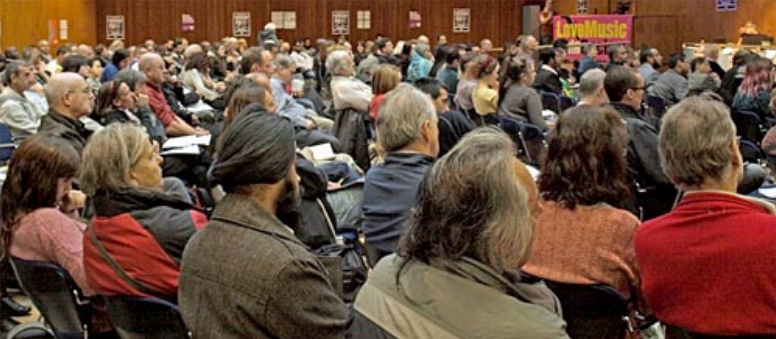
Over 400 anti-fascist campaigners came to a conference at the TUC’s congress centre in London last Saturday.
The event was titled Celebrate Diversity, Defend Multiculturalism, Oppose Islamophobia and Racism. It was called by Unite Against Fascism (UAF) and One Society Many Cultures, and sponsored by South East Region TUC (SERTUC). It challenged European politicians’ race to demonise Muslims and immigrants as they try to shift blame for the economic crisis and austerity. Speakers and delegates were united in calling for far-right mobilisations to be met with counter-protests.
TUC deputy general secretary Frances O’Grady praised the RMT transport workers’ union. The RMT threatened to close Liverpool Street station to stop the English Defence League (EDL) during its failed attempt to march through Tower Hamlets last month. “The real division in Britain today is between the rich and the rest,” she said. She added that she hoped the 30 November strikes would see “the biggest mobilisation of working class people in a generation”.
Labour shadow minister Peter Hain said that “organising through UAF is fundamental” if we are to defeat fascism. He added that the Anti Nazi League did this through its protests in the 1970s and 1980s.
Dilowar Khan from the East London Mosque drew on the experience of the Tower Hamlets counter-protest against the EDL in September. “Some told us to stay at home, but we wanted to show unity,” he said. “We had to challenge them.”
There was a lively debate on whether anti-racists should call for EDL marches to be banned. Before the Tower Hamlets protest, the government banned all protests in five east London boroughs for a month. “The ban was good, but brought a lot of confusion,” said Dilowar, who called it a “double-edged sword”.
Sabby Dhalu, joint secretary of UAF, said, “In Tower Hamlets we’d not have had a victory if the EDL march had gone ahead”. She said that this was partly due to the ban. But she also argued that mobilising against the far right was the only way to stop them.
Martin Smith, from UAF and Love Music Hate Racism, argued for “maximum unity” against fascists. But he added that the ban demobilised anti-racists. “You can’t rely on Theresa May or the police to defend us,” he argued. “We have to rely on ourselves – it’s the only way.”
Other sessions included talks on defending immigration, holding the media to account and the government’s “anti-terrorism” strategy that targets Muslims.
